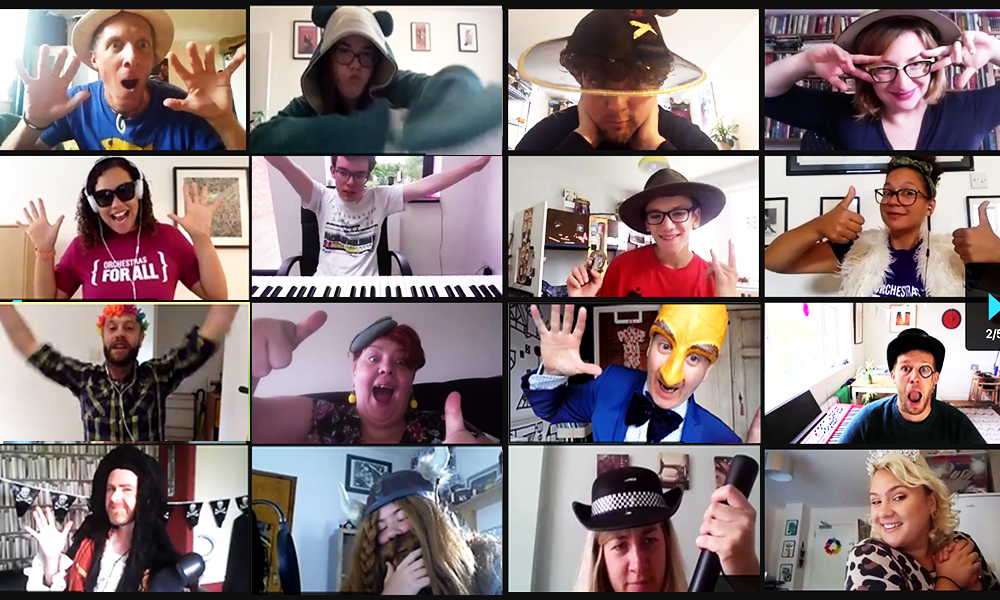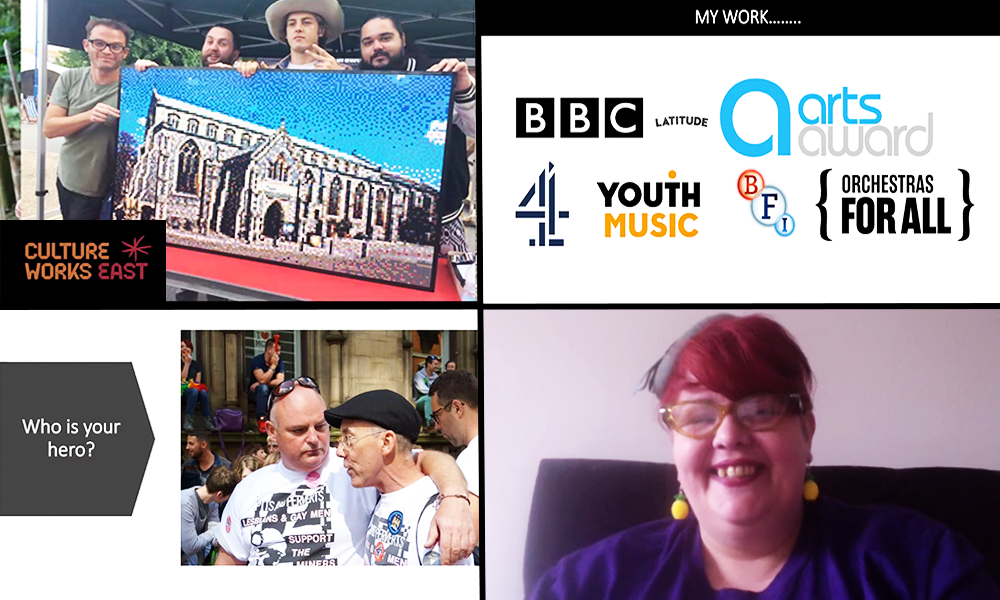The star beatboxer insists that no-one should ever be restricted from playing music with others.
British beatboxer and tenor, James Botcher, has spoken out about the growing need for young people to bond through music-making.
Known to his fans as ‘Beatbotch’, James – who also teaches singing, piano and music theory – is convinced that group music-making creates “unique and meaningful” connections.
The freelance musician shares his view following a turbulent year for young people and music leaders in the UK, amid the coronavirus pandemic.
During his recent workshop at NOFA Festival 2021, James introduced the 100 young members of National Orchestra for All (NOFA) to the art of beatboxing and encouraged them to pursue their musical dreams regardless of their background.
After the event, we caught up with James to find out more and hear about his inspiring life in music.
What’s your earliest musical memory?
I’ve played the piano ever since I was a boy. I can still remember my mum teaching me to play almost 20 years ago – and can even remember my ABRSM graded exams and performances at my primary school!
Who, or what, inspired you to pursue a career in music?
Although I don’t come from a family of musicians, music has always been in my life. Being able to spend my time in secondary school – engaging more and more with the musical world – made me want to spend more time in it, until I just realised it was what I wanted to do one day. I was very lucky to have a supportive and encouraging music department at school to guide me in the direction I chose.
Discover how to set up an inclusive ensemble in your school >
Could you tell us about some of your career highlights so far?
Something I really enjoy is singing for film and video game soundtracks – the most exciting recording session I’ve done to date has to have been for World of Warcraft. That was back in 2019 with the London Voices – I didn’t know what I had been booked for until I turned up and I play games myself, so that was a small dream come true!
Other highlights include being a semi-finalist beatboxer at The Voice Festival UK, visiting the world’s first ever beatbox camp, and singing with I Fagiolini as chorus in Monteverdi’s L’Orfeo!
‘Perform in ensembles, take up lessons and enjoy your time with your instrument,’ says the beatboxing pro
What do you enjoy the most about beatboxing?
There are a few things I really love about beatboxing. It offers the opportunity to be spontaneous and interactive. Beatboxers love to jam together and improvise with each other on the spot to create something entirely live and reactive.
Similarly, providing vocal percussion for an ensemble allows you to work as an accompanist, reacting by shaping your sounds to match the tone and texture of the piece! I think my favourite part would have to be that it’s so accessible. I’m a firm believer that anyone and everyone can be a beatboxer and have fun doing it. It’s all boots and cats!
You’ve also performed some beautiful choral pieces. Why should young people be open to all musical genres?
I believe that young people should be open to all musical genres because you never know what style, instrument or era you’re going to enjoy until you’ve tried it! For those young people who have found their niche, I would still recommend playing music of styles and eras that you’re less familiar with or wouldn’t normally study because you can only develop as a musician by learning more.
A very important thing I was told towards the end of my time at secondary school is: “You don’t have to enjoy listening to a piece of music to enjoy playing it.” This turned out to be true when I had a great time playing plenty of contemporary percussion in my time at university, but you’d be hard-pressed to find me listening to composers like Xenakis.
If you could share any top tips with NOFA members who are considering a career in music, what would they be?
If you enjoy it then you should play it, study it, go for it. Do as much as you can (or want) to do while also looking after your health. Perform in ensembles, take up regular lessons if these are available to you and enjoy your time with your instrument. This last step is crucial because if you pursue a career in music, you’ll be spending a very long time with it!
Read more: Over 100 school pupils nationwide team up online for epic day of music-making >
Why has wellbeing become so important for musicians during the coronavirus pandemic?
During the pandemic, there have been almost no opportunities to perform or to musically interact with others. When your career is built around these things, it’s not just tough financially, but also emotionally.
The need to isolate from others meant that for many musicians, their passion and career was suddenly taken away, leaving them without structure or a safety net. Self esteem, mental health and having the motivation to practice have all taken a hit over the past year and a half.
11 ways playing music with others can boost your wellbeing >
Being unable to talk about emotions and without gigs to look forward to, it became incredibly important for musicians to practice wellbeing – to make a conscious decision to look after one’s own physical and mental health, to be mindful, and to remember there are better days to come. Thankfully, these better days seem to be beginning now – at last!
What are your plans for 2021-22 – do you have any exciting projects in the pipeline?
I have a few gigs and recordings coming up. I’m most looking forward to performing as the tenor soloist for The Sirius Orchestra’s rendition of Haydn’s The Creation next month! Like many others, I’ve had a lot of work cancelled (some as recent as the start of August), so it’s great to see work solidly booked in again.
Why should the public support Orchestras for All?
Orchestras for All is cool! Music is so important for young people. Even if we ignore studies that suggest students who engage with music perform better in some academic subjects (such as maths, English and the sciences), it is still an emotional and social outlet.
It allows young people to connect with themselves – and with others – in a completely unique and meaningful way. I believe that nobody should ever be restricted, in any way, from being able to enjoy music-making and that with more people enjoying it, it can only develop as an art form.
Would you like to give the gift of music-making to a young person? Please donate today >














































